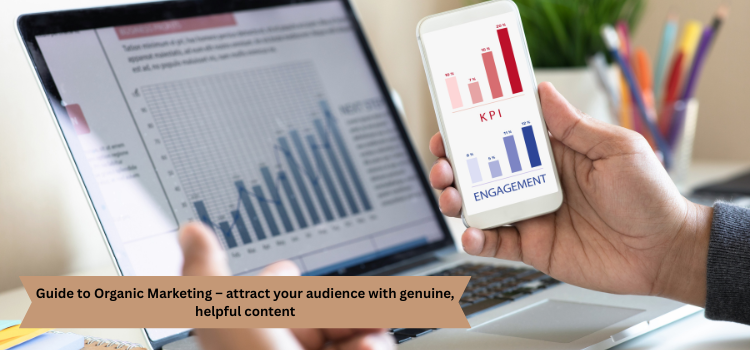Home » Guide to Organic Marketing: Build Trust & Grow Without Ads

When I first began selling my artwork online, I couldn’t afford ads. Instead I wrote about my process, shared photos and emailed friends. New faces showed up in my comments, not because I paid for their clicks but because they were curious. That’s the essence of organic marketing – sometimes called organic online marketing – building relationships instead of buying attention. If you’ve ever wondered what organic marketing is, think of reaching people because they want to be part of your story.
Organic marketing means raising awareness without paying for every impression. You create content that answers questions or entertains and share it on your own channels – blogs, newsletters, social media, events and podcasts. Over time people find you through search or recommendations. This isn’t a trick; it’s about being helpful. Organic advertising happens when you earn attention because your guide or video genuinely helps someone.
A friend of mine runs a home bakery. She posts photos of her cupcakes and stories about the ingredients. When she opened an online store, orders arrived because people already felt connected. Research backs this up: leads from organic channels convert better than those from paid ads because people discover you on their own terms. Another reason to invest in an organic marketing strategy is longevity. A great article or video keeps working long after it’s published. Authenticity builds credibility; people trust a shaky tutorial filmed in a real kitchen more than a polished commercial.
Beyond conversion, organic marketing suits small budgets. Your investment is time rather than ad spend. Because you aren’t paying for every view, you can speak directly to people who care. By answering questions in your own voice, you attract people who share your values and are more likely to stay and tell others.
There are many types of organic marketing, but you don’t have to do everything. Typical organic channels include search engine optimization (SEO), which makes your website visible when people search; blogging and guest posts that share stories and reach new audiences; social media communities that allow real conversations; user‑generated content such as photos or testimonials, which act as powerful social proof; email newsletters that nurture long‑term relationships; podcasts and live events for deeper engagement; and content partnerships that tap into other communities. Choose a couple that fit your strengths and audience. You don’t need all of them.
SEO deserves a special mention. Many people think it’s about tricking Google, but the best organic marketing strategy begins with writing for humans. When you answer real questions in clear language and structure your page sensibly, you help both readers and search engines. Social media works the same way: algorithms reward genuine engagement. Respond to comments, share behind‑the‑scenes moments and ask your audience for input. This kind of organic advertising builds trust rather than trying to game a platform.
So how do you create a plan? Start by listening. Spend time in forums or social feeds where your customers hang out and note the questions they ask. Those questions become topics for blogs, videos or workshops. Focus on a few tactics rather than chasing every platform. Consistency beats occasional bursts: ask questions, reply to comments and post when your audience is online. Measure what matters—traffic, sign‑ups, replies—and adjust. An organic marketing strategy is a learning process; each piece of content is part of a longer conversation.
Once you know where to publish, set simple goals. Do you want more subscribers, enquiries or comments? Track those numbers and adjust. If your aim is course sales, watch how many people click from a blog post to your course page. For engagement, notice which posts spark conversations. Let your organic marketing strategy evolve as you learn what your audience values.
Stuck for organic marketing ideas? Here are a few: share your origin story – people love purpose; teach what you know through tutorials; host a live Q&A to answer real questions; run polls or quizzes to involve your audience; highlight your customers with photos or testimonials; collaborate on a webinar or guest post; and give a sneak peek behind the scenes – people love to see how your work comes together. Try one idea at a time and watch how people respond. Often, the best organic promotion comes from genuine curiosity.
Organic marketing and paid advertising aren’t opposites; they complement each other. Algorithms increasingly favour sponsored posts. If you have a blog or video that resonates, a small ad spend can introduce it to new people. Let your organic efforts build trust and use paid ads sparingly to amplify what’s working.
Organic marketing is like gardening: you plant seeds and nurture them. Results don’t arrive overnight. Blog posts must be indexed before search engines show them, and a following takes months to grow. When my friend opened an online bakery, her recipes and replies felt fruitless at first. By month six, those posts drove most of her orders. Organic online marketing flourishes when you stay true to your voice and show up regularly. People notice genuine help, and those small interactions add up.
Patience isn’t waiting; it’s learning. As you commit to organic marketing, you learn about your audience and refine your voice. That work pays off: your brand feels human, and your community feels heard.
Organic marketing—whether you call it organic promotion, organic advertising or simply storytelling—is about trust. Instead of shouting, you speak clearly and consistently. You pick an organic channel that suits you and experiment with types of organic marketing that feel natural. You listen, share and invite conversation. In a scroll of ads, being the person who answers questions and offers value stands out. Start small, notice what resonates and be patient. Those relationships can become the foundation of your business.